When Mental Illness Strikes Unexpectedly

“Awesome,” the social worker for Clermont Mercy’s Behavioral Health Institute said after sitting in on my National Alliance on Mental Illness (NAMI) talk at the Clermont Mercy Hospital in Batavia, Ohio. Internally, I sighed with relief. I had just completed my first Friday NAMI talk at the Behavioral Health Unit at Clermont Mercy in months.
My name is Danei Edelen. I am the founder and president of the NAMI Brown County Ohio affiliate established in Brown County Ohio in June of 2018. We have been offering NAMI’s support groups in Brown County for over a year. Since July of 2018, I have routinely given a “talk” every other Friday about who NAMI is, what are the NAMI programs that can help, and shared my personal struggle at Clermont Mercy Hospital’s Behavioral Health Institute.
Where I’ve been
You probably haven’t heard from me in a while. For the last seven months, I’ve been out of commission, dealing with my own struggles. As can happen to anyone that lives with a mental illness, my mental illness unexpectedly struck in the form of a sodium deficiency that landed me in the Intensive Care Unit (ICU) for five days because my blood sodium level mysteriously dropped to 114. A normal blood sodium level is between 135 and 145 milliequivalents per liter (mEq/L). Hyponatremia occurs when the sodium in your blood falls below 135 mEq/L.
First, I landed in ICU due to sodium deficiency, then I missed my son’s high school graduation due to a visit to the University of Cincinnati Psychiatry because of psychosis. With mental illness, there are no guarantees. You can be “on top of the world” and then your body will betray you.
All I know is I came home from the hospital to be greeted by messes I had made during psychosis. To be quite honest, the last six months have been a blur.
My return
For me, talking on the Behavioral Health Institute again felt like a tangible first step to getting back to my old self. “NAMI has something called the Emotional Stages of Recovery. Being here means you have just experienced a catastrophic event,” I said to the patients. Those words apply to me as well.
Support, comfort, empathy for confusion, crisis management, hope, etc. are all critical components for successfully navigating this first stage according to NAMI. I routinely ask where the patients are from. Many of the patients in Clermont Mercy are not from the neighboring Brown, Clermont or Hamilton counties. Psychiatric hospital beds are at a premium. Many of the patients will need to be proactive to find the NAMI affiliate that covers their county.
Acceptance and Coping
Learning to cope is the second stage in the process. Dealing with a brain disease means dealing with a whole host of emotions: denial, anger, bargaining, depression, and finally acceptance. As you learn in the NAMI classes, learning to cope isn’t linear. Acceptance of an illness is difficult regardless of where it is located in your body. Finding a safe place to vent your frustrations with the system, learning what self-care means, and learning the system are all vital components in this second stage of the process. Through the NAMI Connection and Family support groups, participants can get ideas from each other on how to cope. NAMI calls this group wisdom.
“The final stage is moving to advocacy.” NAMI talks about learning to navigate the system, finding hope, and learning to successfully manage your own care takes time. I know from personal experience what a difference it makes if your family and friends have been through the NAMI programs. Despite my recent setback, I am very grateful for how supportive my family and friends have been. Most people don’t know what to say or do. Bringing a bag of groceries, offering to drive me to appointments, or going out to lunch with me once I could speak again, meant the world to my husband and me.
Resilience and Hope
After talking about the NAMI programs, I share with them an abbreviated In Our Own Voice (IOOV) presentation. This is a NAMI advocacy program we give at colleges and businesses to educate people about mental illness and dispel the misconception that all people with a mental illness are dangerous or violent. By telling the patients my story, they realize I once sat where they are sitting. I talk to them about starting a NAMI affiliate in Brown County and about writing columns for the News Democrat and The Clermont Sun, two newspapers willing to discuss mental illness.
After hearing my story, the patients begin to talk. They discuss their difficult pasts, the guilt of hurting the ones you love, not being able to forgive yourself, and more. “This presentation has been the most important information I have received,” one woman said. Her words made my struggle to get back to Clermont Mercy Hospital worth it. I was amazed by my warm reception to resume my NAMI talks. “She was was always a joy to have on the unit,” responded the Director of Nursing.
As a reader of my blogs in the past, you deserve an explanation as well. My time has not been on the beach, on vacation, or any of those enjoyable things. I have been once again in the trenches, wrestling with my mental illness. Does it suck to have a mental illness? Yes. Is life hard? Yes, at times. But, there is life after a mental illness diagnosis.













